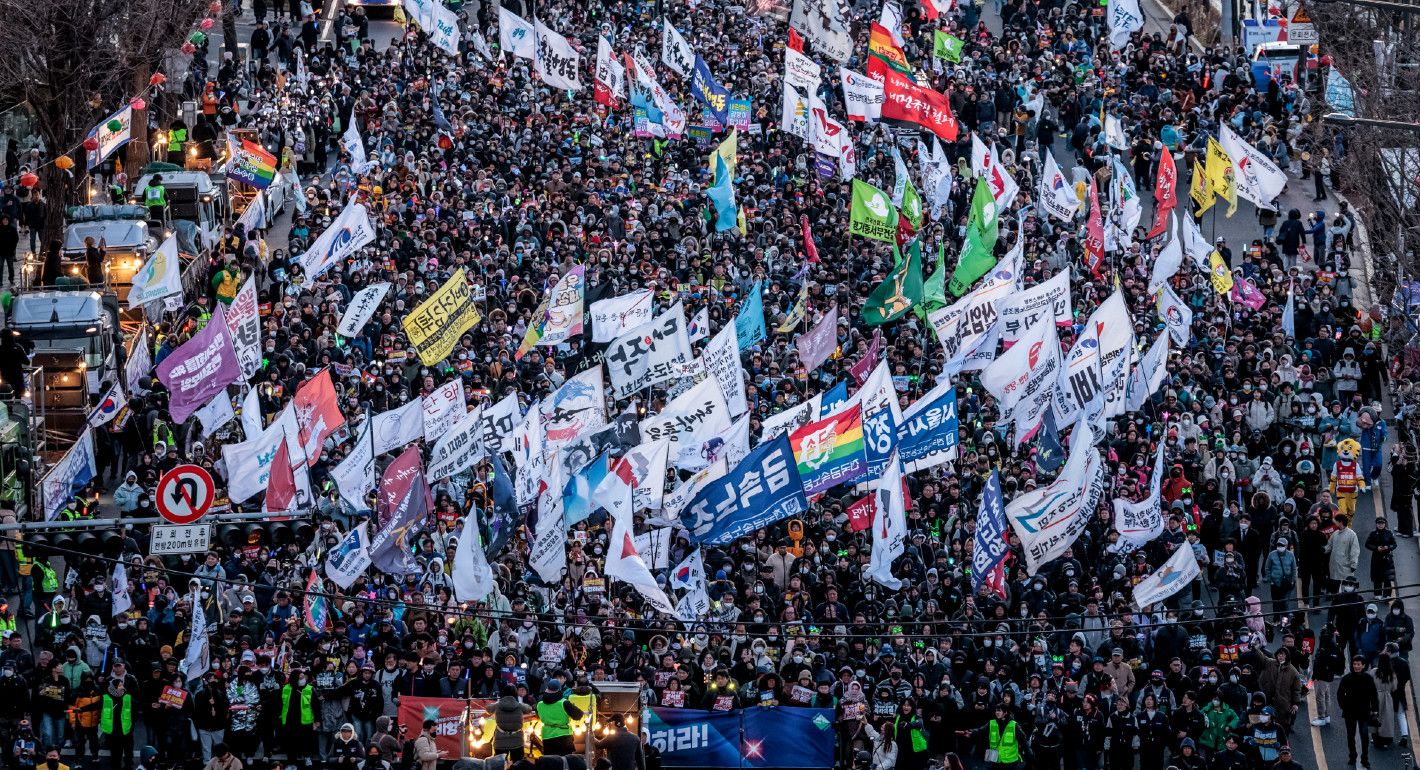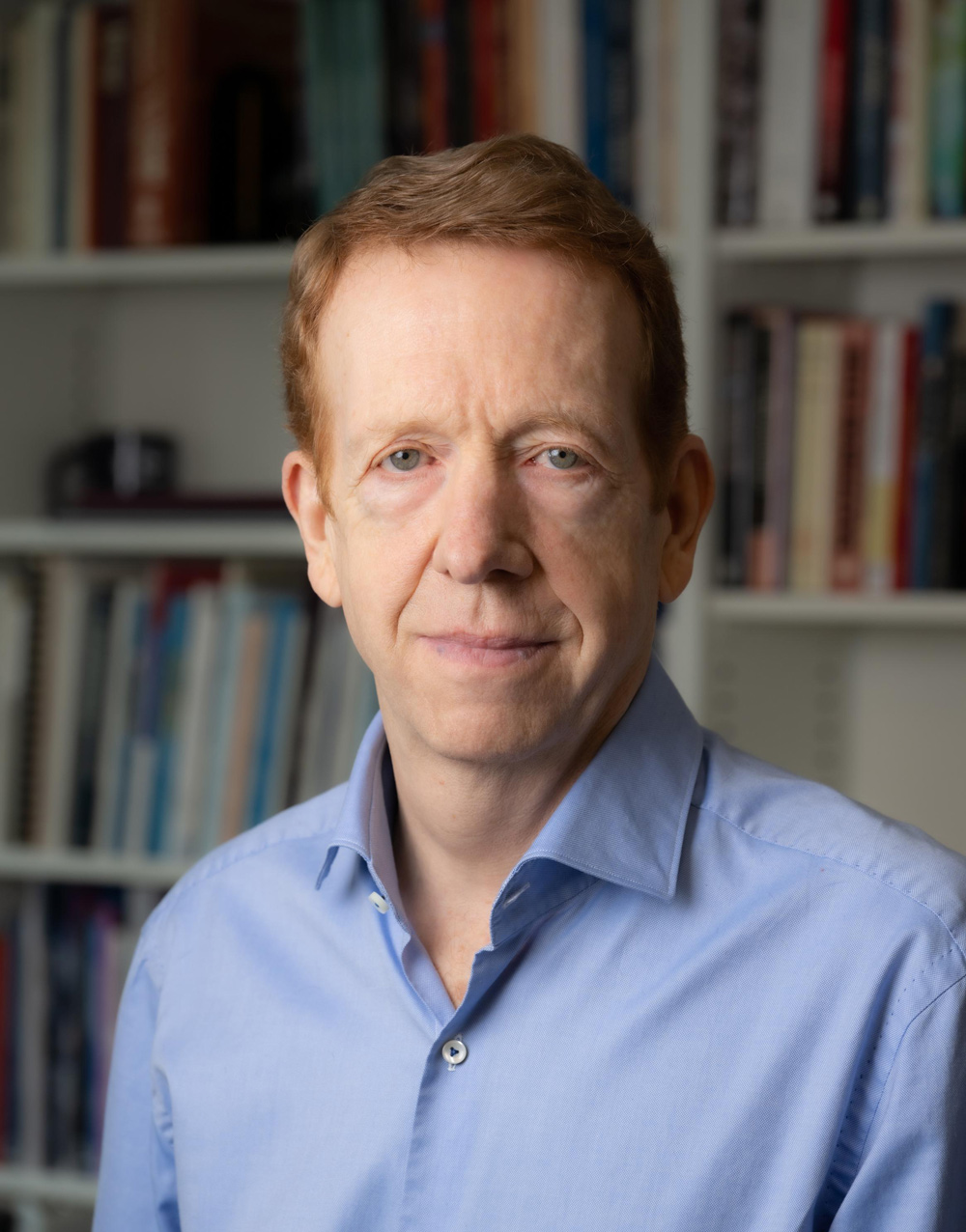What happens next can lessen the damage or compound it.
Mariano-Florentino (Tino) Cuéllar
{
"authors": [
"Darcie Draudt-Véjares"
],
"type": "commentary",
"blog": "Emissary",
"centerAffiliationAll": "dc",
"centers": [
"Carnegie Endowment for International Peace"
],
"collections": [
"Korea: Emerging Player",
"Dynamic Governance Risks in Asia"
],
"englishNewsletterAll": "asia",
"nonEnglishNewsletterAll": "",
"primaryCenter": "Carnegie Endowment for International Peace",
"programAffiliation": "AP",
"programs": [
"Asia"
],
"projects": [],
"regions": [
"South Korea"
],
"topics": [
"Democracy"
]
}
Source: Getty
Yoon is out—and the coming election will be deeply contentious.
On Friday morning Seoul local time, South Korea’s Constitutional Court unanimously upheld the National Assembly’s vote to impeach President Yoon Suk-yeol, formally removing him from office for his December attempt to impose martial law. The ruling marks a pivotal moment in Korean democratic history: a decisive rebuke of authoritarian overreach, delivered through constitutional means.
While the country’s hard-won democratic institutions held firm, a deeper challenge looms. South Korea’s democratic resilience has never been solely about institutional design—it is forged in the collective will of its people. Now, that collective stands sharply divided.
The four months since Yoon’s December 3 martial law decree have marked one of South Korea’s most tumultuous democratic periods. What began as a shocking late-night announcement—with Yoon accusing opposition lawmakers of collaborating with North Korean communists and suspending political activities and press freedoms—was met with swift resistance when lawmakers forced their way past soldiers to vote down the decree.
Initially, leaders from Yoon’s own party, the People Power Party (PPP), repudiated the president’s decision to send troops to take over the National Assembly, with party leader Han Dong-hoon urging an “orderly retreat.” However, as impeachment proceedings gained momentum, conservative lawmakers rallied behind the president, boycotting the December 7 vote, though failing to prevent his impeachment a week later.
In the months since Yoon’s impeachment, rival protest movements have mobilized across Seoul, revealing South Korea’s stark ideological divide. Yoon’s supporters, strengthened by a powerful base of religious conservatives and right-wing social media figures, have framed the impeachment as a constitutional crisis without legal merit. Many have adopted increasingly extreme rhetoric, portraying the process as “a war between communism and democracy” and claiming the opposition seeks to unite with North Korea under a communist system. Meanwhile, thousands of anti-Yoon protesters gather each weekend at Gwanghwamun Square—a site historically linked to the 1980s pro-democracy movement—arguing that his martial law declaration represented a direct assault on democratic institutions that must be decisively punished.
As anticipation for the court’s verdict intensified, Korean police elevated their alert to the second-highest level possible, declaring the area surrounding the Constitutional Court a “vacuum state”—a buffer zone designed to segregate opposing demonstrators—and more than 14,000 Seoul police were mobilized in advance of the court decision. The court’s perimeter, ringed by police buses and barricades, became a physical manifestation of the nation’s political polarization.
Korean democracy has repeatedly demonstrated its strength against executive overreach through bottom-up mobilization. Civic resistance effectively halted Yoon’s martial law decree when protesters flooded the streets and lawmakers physically circumvented barriers to reach the National Assembly. The institutions functioned because a deeply rooted democratic ethos—cultivated through decades of struggle against authoritarian rule—compelled citizens and civil society to act decisively.
Yet while that episode highlighted democratic resilience, the impeachment process has exposed serious fault lines. This represents the longest and most intensely scrutinized presidential impeachment in South Korea’s history. During former president Park Geun-hye’s impeachment process—from December 2016 to March 2017—public approval for accountability consistently exceeded 70 percent, reflecting a broad-based demand for reform. While ideology influences opinions on impeachment in both cases, the public response during Park’s removal was notably more unified. In contrast, support for Yoon's removal has remained polarized, with the most recent polling showing 57 percent supporting impeachment versus 37 percent opposing it, with stark regional variations.
Although both impeachment cases show overwhelming progressive support—likely reflecting that both impeached presidents were conservatives—the biggest shift emerges among conservatives and centrists: among conservatives, support for impeachment dropped from 50 percent in 2017 to 22 percent in 2025, while among centrists, approval fell from 86 percent to 67 percent.
The reasons for this divergence are both historical and structural. Since democratization in the late 1980s, Korean politics has been characterized by deep partisan cleavages, the “South-South conflict” that rages alongside the stalled war with North Korea. These divisions, founded in ideological, generational, and regional rivalries, have intensified in the digital era. Contemporary South Korea features a far-right bloc, energized by online misinformation and anti-communist sentiment, positioned against progressive forces whose critiques of established power have grown increasingly assertive. Claims of “fake news,” election fraud, and North Korean interference now dominate mainstream political discourse.
Recent public opinion data illustrate this challenge. The partisan division evident in the impeachment process (with 95 percent of Democratic Party supporters favoring impeachment versus just 6 percent of People Power Party supporters) reflects deeper ideological fissures about South Korea’s governance and national identity. The generational dimension is particularly noteworthy, with voters in their forties overwhelmingly supporting impeachment (77 percent) while older cohorts in their sixties and seventies remain more opposed (47 percent and 59 percent respectively). Support for impeachment also varies dramatically by region—reaching 80 percent in the traditionally progressive Jeolla provinces but just 33 percent in conservative North Gyeongsang, according to Gallup Korea’s most recent poll.
Many of Yoon’s supporters remain convinced that his martial law declaration was justified to address perceived national security threats, while opponents view it as an unambiguous assault on democratic governance. These polarized interpretations have not diminished following the court’s ruling; if anything, they have calcified further.
In sixty days, South Korea will conduct a presidential election that polling suggests will be deeply contentious. Democratic Party leader Lee Jae-myung currently leads preference polls with 34 percent support, far ahead of other potential candidates in a field fractured among several low-polling conservatives. Notably, Lee lost to Yoon in 2022 by less than a percentage point in a highly contested election with deep social divides. Underscoring this political momentum shift, polls show Lee Jae-myung leading all potential conservative candidates by substantial margins in head-to-head matchups, with gaps ranging from 25 to 37 percentage points. But there are a variety of conservative dark horses who could pull ahead in the next two months, particularly as Lee struggles with his own legal drama.
Beyond the electoral calculus, South Korea faces a more profound challenge that is neither legal nor political—it is social. Healing the nation from this intense polarization will require more than installing a new president. South Korean society must find ways to reconceptualize political opponents not as enemies but as stakeholders in a shared democratic project. The country’s democratic institutions have withstood coups, authoritarianism, and now another presidential impeachment. Whether this resilience persists will depend largely on South Koreans’ capacity to bridge the chasms that have long divided their society.
Carnegie does not take institutional positions on public policy issues; the views represented herein are those of the author(s) and do not necessarily reflect the views of Carnegie, its staff, or its trustees.
What happens next can lessen the damage or compound it.

Mariano-Florentino (Tino) Cuéllar
The uprisings showed that foreign military intervention rarely produced democratic breakthroughs.


Amr Hamzawy, Sarah Yerkes
Venezuelans deserve to participate in collective decisionmaking and determine their own futures.

Jennifer McCoy
When democracies and autocracies are seen as interchangeable targets, the language of democracy becomes hollow, and the incentives for democratic governance erode.


Sarah Yerkes, Amr Hamzawy
A guide to diagnosing the trajectory of democracy around the world in 2026.

Thomas Carothers, McKenzie Carrier